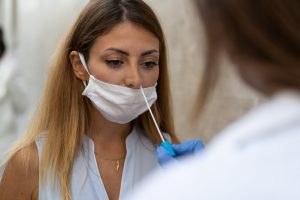- Paper presented at the 37th Annual Congress of the European Society of Human Reproduction and Embryology (ESHRE)
- A total of 12,416 screenings at different epidemiological points in time were analysed
During the 37th congress of the European Society of Human Reproduction and Embryology (ESHRE 2021), the Spanish Fertility Society (SEF) presented the conclusions of the study entitled Low SARS-Cov-2 positivity rate in women included in ART programs following the recommendations of the Spanish scientific societies on reproduction, which was carried out during the months of the health crisis for COVID-19 and in which the rates of positivity of this disease in Spanish assisted reproduction centres were analysed.
The research concludes that between April 2020 and 15 January 2021 these clinics maintained lower than 1% COVID-19 positivity among their patients. In total, 12,416 screenings were carried out in three different time periods (2,695, 4,068 and 5,653, respectively) with active infection detection tests being applied at a rate of more than 70% in all surveys. Specifically, in the first phase analysed, from 27 April to 30 June 2020, the incidence was 0.31%; in the second, from 1 July to 31 August 2020, it was 0.36%; and in the third, from 1 September 2020 to 15 January 2021, it was 0.93%.
“The results show that positivity rates in assisted reproduction clinics in Spain has been low during the different phases of the pandemic and, therefore, support their good judgement in the setting up and management of safety measures for the detection of the disease in the clinics”, stresses Daniel Mataró, medical director of CIRH, a clinic belonging to the Eugin Group, and lead author of the study promoted by the SEF working group (JA Castilla, I Cuevas, JA Domínguez, D Mataró, D Mataró, and ASEBIR (B González de Bustamante, B Buch, N Prados, F Prados Mondéjar).
A history of the pandemic in assisted reproduction clinics
In March 2020, due to the health crisis caused by COVID-19, most of the Spanish assisted reproduction centres’ services were halted due to the possible collapse of hospitals and health resources. A few weeks later, in April, the SEF and ASEBIR (Association for the Study of Reproductive Biology) released a statement in which they believed it was possible to resume the activity of these clinics, along with a series of safety recommendations for both patients and workers, which included, among others, screening tests, screening for symptoms, records, hygiene, training and information, as well as social measures.
At that time, the SEF requested the participation of assisted reproduction centres in order to monitor the recurrence of the disease in this setting and to analyse the incidence of cases using the recommendations provided. To do so, they relied on three surveys that measured data at different epidemiological points in time. In total, up to 29 centres from all over Spain took part, including those of the Eugin Group in Barcelona and Madrid.
